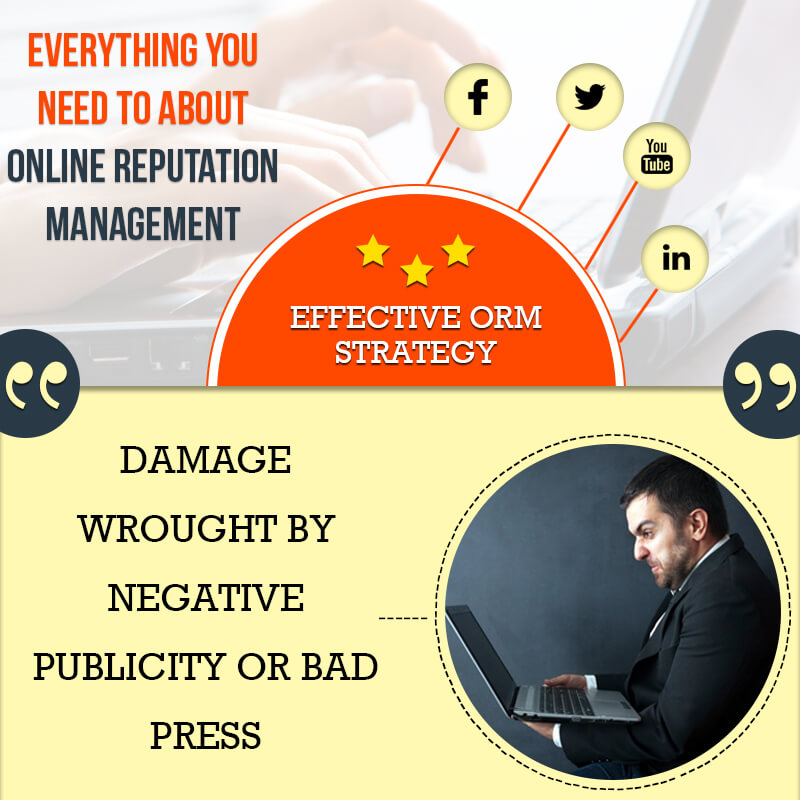 Online reputation management is an effective remedial or corrective technique that businesses, both big and small, take advantage of in order to brush their images (tarnished by the bad press) on search engine’s SERPS. ORM as a quick fix for tackling negative publicity on the web can be smoothly integrated with your company’s SEM or SEO strategy. Negative or destructive feedbacks, comments, and blogs (and sometimes entire sites) about a product or service posted by anonymous complainants/users on automated social networking sites brings down it is ranking on Google.
Online reputation management is an effective remedial or corrective technique that businesses, both big and small, take advantage of in order to brush their images (tarnished by the bad press) on search engine’s SERPS. ORM as a quick fix for tackling negative publicity on the web can be smoothly integrated with your company’s SEM or SEO strategy. Negative or destructive feedbacks, comments, and blogs (and sometimes entire sites) about a product or service posted by anonymous complainants/users on automated social networking sites brings down it is ranking on Google.
Damage wrought by negative publicity or bad press
Grievances voiced by users of a brand (looking for a shallow alibi to vent their complaint) on Facebook or Twitter have the potential of going viral, eventually besmirching the manufacturer’s or service provider’s online reputation. The cloak of anonymity offered by social networking sites encourages and emboldens subscribers to air their accusations regarding a brand which can reduce the firm’s or entrepreneur’s earnings. Those posting malicious or off-putting comments rarely reveal their actual names or addresses rendering it next to impossible for the affected firm to trace the source and address the grievance.
If you or your company has been victimized by bad publicity, you’re the ideal candidate to opt for an online reputation management damage-control exercise. But before you do, you should apprise yourself of the extent of the undesirable impact that negative publicity or bad press can have on your or your brand’s online status.
ORM: Striking before it starts to hurt
When it comes to getting an online reputation management action plan underway, most companies adopt a reactive strategy. By the time the ORM campaign starts delivering, a considerable damage has already been done as the highly ranked sites or web pages act as breeding grounds for inbound links. Muffling the top ranking pages littered with unconstructive comments becomes all the more difficult as the inbound links further reinforce the ratings of the pages.
On the other hand, an ORM promotion that takes a preemptive and proactive approach is highly successful in thwarting bad press from gaining ground and becoming viral. Such a hands-on ORM strategy is devised in a manner that it is extremely effective in monitoring the top-ranked organic standings. A constructive ORM plan should be able to preempt negative publicity and shield the company from the damaging feedbacks of perverted customers and frustrated employees.
Stemming bad press with ORM
Popular search engines including Google, Bing, and Yahoo index and rank web pages or sites based on specific SEO algorithms. Individuals who’re well versed in creating negative remarks are aware that posting the comments or blogs on high-ranking blogs will publicize the same across the social networking platforms. As a result, when or whenever anybody browsers on the net to find out details about your business, they’ll mostly see links badmouthing your firm. Reverse SEO is an excellent online reputation management technique that can help you obliterate the negative publicity placed on the top URLs in the first SERP.
What is an effective ORM strategy comprised of?
Online reputation management, very much like SEO exploits a multi-faceted strategy so as to safeguard your company’s reputation across the web. An effectual ORM plan first targets exactly those web pages or sites where the maximum bad press regarding your firm is abounding. In the next stage, these websites and pages are scrutinized based on their ranking status.
Once you’re aware of the ranking parameters that these sites have exploited to clamber to the top, you’ll be in a position to use the appropriate tools and/or techniques to remove the links from the sites. In the third and final step, you’ll be taking advantage of the relevant tools such as profiles on social media, bookmarking programs, PRs, and a bevy of newly launched blogs or sites.








